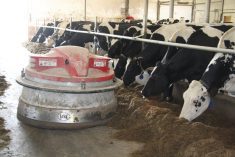Allowing shipments of banned Canadian beef into the United States may have been a mistake but posed no risk to public health, say American government officials.
Reports of millions of pounds of processed and ground beef entering the U.S. raised questions on the first anniversary of BSE closing the border. However, U.S. Department of Agriculture officials told reporters in a teleconference May 21 the product would have been permitted but greater scrutiny should have been applied to the imports.
“To say that we erred in process is correct,” said Bill Hawks, undersecretary for USDA marketing and regulatory services.
Read Also

Manitoba extends Crown land rent freeze
Manitoba government links the continued rental rate freeze on grazing and forage leases to economic and environmental challenges facing the industry
“To also say that we have taken stock of those errors, we are taking the measures to ensure that that does not happen again,” he said.
Elsa Murano of the food safety inspection service said all the imports were checked by meat inspectors to see what was coming in from particular countries.
Shipments from Canada were about 7.3 million pounds rather than the 33 million lb. reported in the Washington Post.
Using import inspection statistics, the actual beef products included 139,298 lb. of bone-in cuts shipped in from Canada after April 19 when the USDA announced these items from animals younger than 30 months were acceptable.
Other products included ground meat from low-risk beef, some organs and offals like lips, tongue, heart and kidneys, as well as further processed material like beef jerky, sausage and deli meats totalling more than six million lb.
Their statistics are derived from import inspectors, she said.
All the products were safe, said Ron DeHaven, chief veterinary officer for the animal plant health inspection service.
“With regard to the ground beef and other processed products, nothing that was allowed in, in the form of ground beef or other processed product, came from raw materials that would not have otherwise been enterable,” he said.
Many of the offal products were in transit to Mexico since there is almost no market for these in the U.S.
“Clearly the process and our failure to announce some of these actions was flawed, but it was all scientifically sound and didn’t represent any additional risk to the U.S. public,” he said.
These shipments were halted after the U.S. group Ranchers-Cattlemen’s Action Legal Fund obtained a court injunction through a federal judge who ruled the USDA did not follow proper administrative procedures. USDA agreed to stop imports.
The USDA has since changed its procedures so technical teams must seek the approval of higher level officials for their actions.
Last August, the USDA announced it would permit boneless beef imports from younger cattle. This did not include ground meat and other products likely to contain brain or spinal cord tissue believed to cause variant Creutzfeldt-Jakob disease, a brain wasting disorder in humans.















